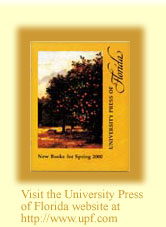
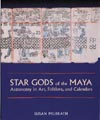
Star Gods of the Maya
Astronomy in Art, Folklore, and Calendars
By Susan Milbrath
University of Texas Press, Austin
"This book is destined to become a standard reference work on Maya archaeoastronomy. [It provides] a basic, sound, and utterly comprehensive introduction to the subject of ancient Maya astronomy."
Susan Milbrath opens the book with a discussion of modern Maya beliefs about astronomy, along with essential information on naked-eye observation. She devotes subsequent chapters to Precolumbian astronomical imagery, which she traces back through time, starting from the Colonial and Postclassic eras. She delves into many aspects of the Maya astronomical images, including the major astronomical gods and their associated glyphs, astronomical almanacs in the Maya codices (painted books) and changes in the imagery of the heavens over time.
This investigation yields new data and a new synthesis of information about the specific astronomical events and cycles recorded in Maya art and architecture. Indeed, it constitutes the first major study of the relationship between art and astronomy in ancient Maya culture.
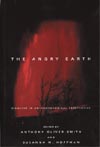 The
Angry Earth
The
Angry Earth
Disaster in Anthropological Perspective
Edited by Anthony Oliver-Smith and
Susanna M. Hoffman
Routledge Publishers
"The Angry Earth should be read
by all who deal with disaster situations."
- - Elizabeth Colson, author of The
Social Consequences of Resettlement
From hurricanes, floods and earthquakes to oil spills and nuclear accidents, natural and technological disasters have become increasingly frequent and destructive across the planet. This ground-breaking collection of essays explores how various cultures in different historical moments have responded to calamity, offering new insights into the complex relationship between society and environment.
Through case studies of communities in Great Britain, the Mediterranean, Asia and the Americas, contributors examine issues ranging from the social and political factors that set the stage for disaster, to the cultural processes experienced by survivors, to the long-term impact of disasters on culture and society.
Susanna M. Hoffman is an anthropologist whose academic works include the films Kypseli: Women and Men Apart — A Divided Reality and the Emmy-winning Faces of Culture<.
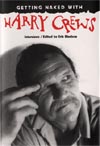 Getting
Naked with Harry Crews
Getting
Naked with Harry Crews
Interviews
Edited by Erik Bledsoe
University Press of Florida
In 26 interviews conducted between 1972 and 1997, novelist Harry Crews tells the truth —about why and how he writes, about the literary influences on his own work, about the writers he admires (or does not), about which of his own books he likes (or does not), about his fascination with so-called freaks and about his love of blood sports. Crews reveals the tender side under his tough-guy image, discussing his beloved mother and his spiritual quest in a secular world. Crews also speaks frankly about his failed relationships, the role that writing played in them, and his personal struggles with alcohol and drugs and their impact on his life and work. Those seeking insights into his work will find them in these interviews. Those seeking to be entertained in Crewsian fashion will not be disappointed.
On advice to young writers ...
"You have to go to considerable
trouble to live differently from the way the world wants you to live. That’s
what I’ve discovered about writing. The world doesn’t want you to do a
damn thing. If you wait till you got time to write a novel or time to write
a story or time to read the hundred thousands of books you should have
already read — if you wait for the time, you’ll never do it. Cause there
ain’t no time; world don’t want you to do that. World wants you to go to
the zoo and eat cotton candy, preferably seven days a week."
Erik Bledsoe is an instructor of English and American studies at the University of Tennessee. He has published articles on Southern writers and edited a special issue of the Southern Quarterly devoted to Crews. His 1997 interview with Harry Crews from that magazine is included in this collection.
 Your
Florida Guide to Butterfly Gardening
Your
Florida Guide to Butterfly Gardening
A Guide for the Deep South
Jaret C. Daniels
University Press of Florida
This book, the third in the popular Your Florida Guide series, offers a thorough look at Florida’s most important butterflies and the plants they prefer for food, shelter and egg laying. The guide helps you select plants for a yard where butterflies can live and return year after year. It includes planting diagrams, easy one-day container projects, and full garden layouts designed for each of Florida’s three major growing zones and suitable for gardens throughout the Deep South.
The author, an avid lepidopterist, persuaded his household to allow their garage to become a butterfly farm and raised many of the creatures pictured in the book. The full-color photographs, all taken by him, show butterflies, the caterpillars they develop from, food plants, host plants and garden designs.
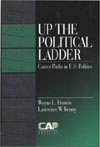 Up
the Political Ladder
Up
the Political Ladder
Career Paths in U.S. Politics
Wayne L. Francis and Lawrence W.
Kenny
Sage Publications
The authors take a look at the careers of U.S. presidents, showing how they successfully climbed the political ladder after starting at the bottom and working their way up. Also illustrated is the impact of term limits on state legislators — patient, highly selective, and successful moves up the political ladder that have been replaced by early exits from office and riskier challenges for higher office.
The book explains why those who are too liberal or conservative for their party and state are less likely to win statewide races and how distance from the "winning state party position" serves as a key to understanding which senators are reelected and which House members enter and win Senate primaries. The authors take readers through theories of ambition and political ladders, selectivity in career decisions, party competition, and upward mobility to explain the backbone of the political system.
Wayne L. Francis is professor emeritus of political science at the University of Florida. He has written six books about American politics and a great number of journal articles for political publications.
Lawrence W. Kenny is professor of economics at the University of Florida, specializing in public choice, political economy and public economics. He has written numerous articles on economics and political science and has coauthored several books about managerial economics.